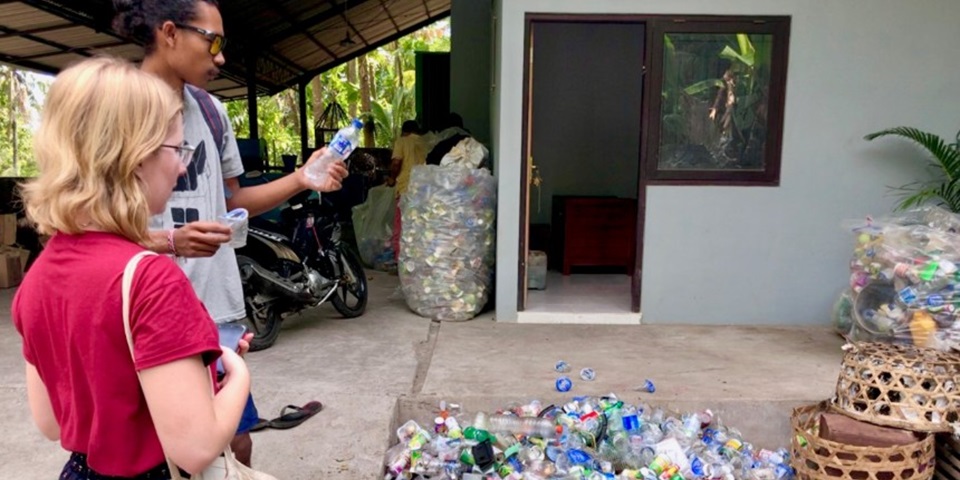News
The Murdoch students helping to change lives with fashion in Bali

Murdoch University students Belle Hewitson and Jessica Moseley have kick-started a waste management project in a small village in Bali that has the potential to change the lives of residents there.
Funded by the Australian government’s New Colombo Plan, the two international development students spent four weeks in the coastal village of Les working on a number of sustainable development projects including a collaboration with local weavers to make a beautiful high fashion handbag from recycled plastic bottle caps.There is already interest in the prototype bag from worldwide fashion retailers TK Maxx, which helped to fund the recycling machines used to produce the bag.
The students are still working with villagers to recruit more weavers, so the bag can be reproduced on a larger scale.
“It could result in a valuable alternative livelihood for the villagers in Les, as well as helping to clean up the environment,” said Belle, from Mandurah.
Many of the villages in Bali do not have diversified income streams – they are known for just one or two products or services, so it is valuable to facilitate alternative options for them.When they first arrived, the recycling machines were not working well enough to produce a quality product. But with persistence and fine attention to detail, the students helped the locals to extract a better quality thread-like filament from the bottle tops, enabling the handbag to be made.
Belle Hewitson
“I think there was a bit of uncertainty at the start about our idea to weave the plastic,” explained Jess, who is from Mount Hawthorn. “It's quite a laborious process to even produce the filament let alone make something out of it. Additionally, people in the past had said the quality of the material was not of high enough standard. “However, once we started producing consistent material there was some more enthusiasm.”
The students also visited the nearby village of Tenganan, which is known for its specialist weaving technique of double ikat. They worked with weavers to make a prototype of a bowl from recycled plastics, that could be sold on the domestic market.“Traditional plates and bowls in rural areas of Bali used for ceremonies and eating are usually made with bamboo,” explained Belle. “But these do not last very long, so we worked with the weavers to come up with a recycled plastic version, which is more durable and still maintains the beautiful craftmanship of the weave. “We’ve come up with the brand name ‘Plastik Cantik’, which means beautiful plastic, for the bowl, the bag and other products to come.”
The students, along with a third member of the project, Holly McWhae, also worked with local children to produce a video on the importance of managing waste, and worked on ways the people of Les could develop their small-scale salt farming industry."It has been an amazing experience because the advice we have given has been taken on, and they're all so eager to learn and improve,” said Jess. "We have learned so much from them."
The cross-cultural experience is so interesting and the experience of living and working in another country instead of just visiting as a tourist is so valuable and life changing.
Jessica Moseley
Belle said the experience had opened her eyes to the issue of waste management in Bali, and she was keen to develop her understanding of what could be done to help with the issue of plastic pollution.
The two students were part of a group of five undergraduates from Murdoch’s Asian Studies, Marine Science and Development Studies programs to recently gain practical experience in Bali as part of the Australian Government’s New Colombo Plan program.
Other members of the group, Nikki Kavanaugh and Saskia Zeimann, worked on a range of projects including helping to build artificial domes for coral reef rehabilitation, teaching English and marine biology, as well as swimming and computer skills to local school children. Saskia was also involved in assisting interns from tsunami affected Sumur to develop a website for their community.News
The Murdoch students helping to change lives with fashion in Bali
Posted on
Topics